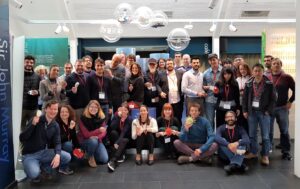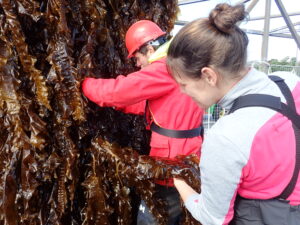It has all been worth it to see the ambitious plans from the project proposal come to fruition.
The IMPAQT project is a Horizon 2020 research and innovation action to promote and support the eco-intensification of aquaculture production systems. It started in 2018, bringing together 21 partners from 12 countries, with the aim to develop and validate a multi-sensing and multi-functional management platform for sustainable IMTA production in various operational environments, with a view to validate the concept of IMTA as a viable aquaculture approach for future European aquaculture.
Looking back, it has been an intense period of collaborative work by all the various individuals working for the diversity of partners, who displayed motivation and dedication throughout – even in the extra 4 months without additional funding to overcome the challenges covid presented! For me personally, as Coordinator, the mountain of emails and the hours-and-hours of meetings will continue to haunt me 🙂 ! – but it has all been worth it to see the ambitious plans from the project proposal come to fruition.

It was interesting watching the biology people had to learn to converse with the technology people to communicate their needs and requirements to each other, to help design the framework for the IMPAQT platform, the communications, the model, and the management system. The six pilot sites were pivotal in the development, deployment, testing and validation of the systems, as well as conducting the IMTA trials, producing the product, and gathering the required information to support the assessments and validations. The innovative prototypes developed in the project will be useful tools for future precision aquaculture. The project successfully demonstrating the sustainability and circularity of IMTA practises, with the results and findings communicated to the stakeholder eco-system through the various communication channels, dissemination and training activities.

It has been a pleasure to see the support for young researchers, working with experienced individuals within the project, and the good balance of women and men working in the project. I look forward to seeing the work continue and the outputs of the project progress the eco-intensification of aquaculture with more environmentally friendly and efficient production systems.
Concluding, I would like to thank you for your interest in our project and your support and engagement throughout the period. I would also like to thank all those who worked on the project for their efforts and dedication over the 40 months – it is much appreciated. Keep an eye on the website and social media as more results and publications from the project become available.
Frank Kane






